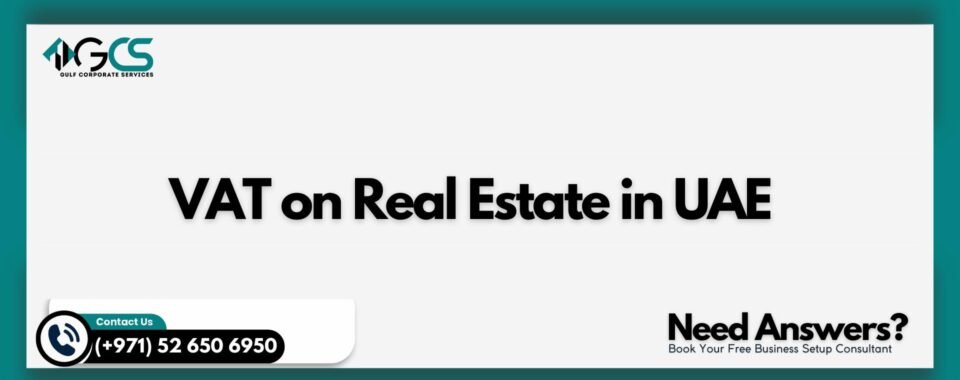
The United Arab Emirates (UAE) has established itself as a global hub for real estate investments, attracting developers, investors, and homeowners with its dynamic property market. Since the introduction of Value Added Tax (VAT) in 2018, understanding VAT on real estate in UAE has become essential for anyone involved in property transactions. Administered by the Federal Tax Authority (FTA), VAT regulations impact the buying, selling, leasing, and development of properties, influencing costs and compliance requirements. This article provides a detailed guide on VAT on real estate, covering its application, exemptions, compliance obligations, and practical tips for businesses and individuals. With a focus on tax compliance and real estate transactions, this guide helps you navigate the UAE’s property market seamlessly.
What is VAT on Real Estate in UAE?
VAT on real estate refers to the 5% Value Added Tax imposed on certain real estate transactions in the UAE, as mandated by the FTA. Introduced to diversify the UAE’s economy, VAT applies to specific property-related activities, such as the sale or lease of commercial properties and certain residential properties. However, the regulations include exemptions and special provisions, making it critical for stakeholders to understand which transactions are taxable and which are not.
The FTA categorizes real estate transactions into taxable, exempt, and zero-rated supplies, each with distinct implications for VAT liability. Whether you’re a property developer, landlord, investor, or tenant, understanding these distinctions ensures tax compliance and optimizes financial planning in the UAE’s competitive real estate market.
Why Was VAT Introduced for Real Estate?
The UAE introduced VAT to reduce reliance on oil revenues and fund public services like infrastructure and healthcare. For the real estate sector, VAT ensures that property transactions contribute to the economy while maintaining transparency. The regulations align with international tax standards, enhancing the UAE’s reputation as a credible destination for real estate investments.
Types of Real Estate Transactions Subject to VAT
VAT applies differently depending on the type of property and transaction. Below is a breakdown of how VAT affects various real estate activities:
Sale of Commercial Properties
The sale of commercial properties, such as offices, retail spaces, or warehouses, is subject to 5% VAT. This applies to both new and existing properties sold by VAT-registered businesses. For example, a property developer selling a commercial building must charge VAT on the sale price and remit it to the FTA.
Lease of Commercial Properties
Leasing commercial properties is also taxable at 5% VAT. Landlords must include VAT in the rental price for commercial leases, such as office spaces or shops. Tenants who are VAT-registered can often recover this VAT as input tax, depending on their business activities.
Sale of New Residential Properties
The first sale of a residential property (e.g., apartments, villas) within three years of completion is subject to zero-rated VAT. This means no VAT is charged to the buyer, but the seller (typically a developer) can recover input tax incurred during construction. Subsequent sales of the same property are exempt from VAT.
Lease of Residential Properties
Leasing residential properties for long-term use (e.g., homes or apartments) is generally exempt from VAT, meaning no tax is charged on the rent. However, short-term leases (e.g., holiday homes or serviced apartments) may be subject to 5% VAT if provided by a VAT-registered entity.
Bare Land and Other Transactions
The sale of bare land (undeveloped land without structures) is exempt from VAT, as is the sale of second-hand residential properties. However, real estate services, such as brokerage or property management fees, are taxable at 5% VAT.
VAT Exemptions and Zero-Rated Supplies in Real Estate
Understanding VAT exemptions and zero-rated supplies is crucial for minimizing tax liabilities and ensuring compliance. Key exemptions and special provisions include:
Residential Property Exemptions
As mentioned, long-term leases and subsequent sales of residential properties are exempt from VAT. This reduces costs for homeowners and tenants, making residential real estate more affordable in the UAE.
Zero-Rated First Sale of Residential Properties
The zero-rated status for the first sale of new residential properties benefits developers by allowing them to recover input tax on construction costs while keeping the sale price competitive for buyers.
Bare Land Exemption
The exemption for bare land sales encourages investment in undeveloped plots, particularly in growing areas like Dubai and Abu Dhabi, without additional VAT costs.
Charitable and Government Properties
Properties owned by charitable organizations or government entities may be exempt from VAT if used for non-commercial purposes. However, these entities must provide documentation to the FTA to claim exemptions.
VAT Compliance for Real Estate Businesses
Businesses involved in real estate transactions, such as developers, landlords, or property agents, must adhere to strict VAT compliance requirements to avoid penalties. Key obligations include:
VAT Registration
Businesses with an annual turnover exceeding AED 375,000 from taxable supplies (e.g., commercial property sales or leases) must register for VAT with the FTA. Voluntary registration is also an option for businesses below this threshold to recover input tax.
Filing VAT Returns
VAT-registered businesses must file VAT returns monthly or quarterly, depending on their turnover. Returns include details of taxable supplies, input tax, and output tax, and must be submitted by the 28th day of the month following the tax period.
Maintaining VAT Records
The FTA requires businesses to keep VAT records, such as invoices, contracts, and payment receipts, for at least five years. These records must be available for FTA audits to verify tax compliance.
Calculating VAT Liabilities
Businesses must accurately calculate VAT on taxable supplies and account for input tax recovery. For example, a developer can recover input tax on construction materials for a commercial property but must charge 5% VAT on its sale or lease.
Challenges of VAT on Real Estate
While VAT on real estate provides clarity and structure to property transactions, it introduces several challenges for businesses and individuals in the UAE’s real estate market. Addressing these challenges requires a thorough understanding of VAT regulations and proactive tax planning.
Complex VAT Classification
Determining whether a real estate transaction is taxable, exempt, or zero-rated can be complex. For instance, distinguishing between commercial and residential properties, or identifying the first sale of a residential property, requires careful analysis of FTA guidelines. Misclassification can lead to VAT underpayment or overpayment, resulting in penalties or lost opportunities for input tax recovery.
Administrative Burden
Maintaining accurate VAT records, filing timely VAT returns, and managing input tax claims add an administrative burden, particularly for small property developers or landlords with limited resources. The need to comply with FTA audits and document retention for five years further increases operational demands.
Impact on Property Pricing
The 5% VAT on commercial properties and real estate services increases costs, which can affect property pricing and competitiveness in the market. Developers and landlords must balance absorbing VAT costs or passing them onto buyers and tenants, potentially impacting demand in a price-sensitive market.
Keeping Up with Regulatory Changes
VAT regulations in the UAE are subject to updates, requiring businesses to stay informed about changes to tax rates, exemptions, or filing procedures. Failure to adapt to these changes can result in non-compliance and penalties from the FTA.
Benefits of VAT Compliance in Real Estate
Despite the challenges, adhering to VAT regulations offers significant advantages for real estate businesses and stakeholders in the UAE:
Input Tax Recovery
VAT-registered businesses can recover input tax on costs related to taxable supplies, such as construction materials for commercial properties or real estate services. This reduces overall expenses and improves profitability.
Enhanced Market Credibility
Compliance with VAT regulations demonstrates a commitment to tax transparency, enhancing a business’s reputation among investors, buyers, and regulatory authorities. This is particularly important in Dubai’s competitive real estate market, where trust is a key factor.
Avoidance of VAT Penalties
Proper VAT compliance helps businesses avoid costly penalties, which can range from AED 1,000 for late VAT return filings to AED 50,000 or more for significant non-compliance issues. Staying compliant ensures uninterrupted operations and financial stability.
Contribution to UAE’s Economy
By paying VAT on real estate transactions, businesses contribute to the UAE’s economic growth, supporting infrastructure, healthcare, and other public services. This aligns with corporate social responsibility goals and strengthens the UAE’s position as a global real estate hub.
Tips for Managing VAT on Real Estate
To navigate VAT on real estate effectively, businesses and individuals can adopt the following best practices:
- Engage Professional Accounting Services: Hire experts in UAE tax laws to ensure accurate VAT classification, timely VAT return filings, and compliance with FTA regulations. This reduces the risk of errors and penalties.
- Use Accounting Software: Invest in software to automate VAT calculations, track input tax, and maintain VAT records, streamlining compliance processes.
- Stay Informed: Regularly check the FTA website for updates on VAT regulations and real estate tax policies to avoid unintentional non-compliance.
- Train Staff: Ensure employees involved in real estate transactions understand VAT requirements, including how to issue tax invoices and document taxable supplies.
- Plan Financially: Factor VAT costs into pricing strategies and budgets to maintain competitiveness while covering tax liabilities.
Conclusion
Understanding and complying with VAT on real estate in UAE is essential for businesses and individuals navigating the dynamic property market in Dubai, Abu Dhabi, and beyond. By grasping the nuances of taxable supplies, exemptions, and zero-rated transactions, stakeholders can optimize tax compliance, recover input tax, and avoid costly penalties. While challenges like complex classifications and administrative burdens exist, proactive measures, such as engaging Accounting services in Dubai, UAE, can simplify the process and ensure seamless adherence to FTA regulations. With the right approach, businesses can leverage the UAE’s real estate opportunities while contributing to its economic growth.
FAQs
What is VAT on real estate in the UAE?
VAT on real estate is a 5% Value Added Tax applied to certain property transactions, such as the sale or lease of commercial properties and real estate services, as regulated by the FTA.
Are residential properties subject to VAT in the UAE?
The first sale of new residential properties within three years of completion is zero-rated, meaning no VAT is charged, but subsequent sales and long-term leases are exempt from VAT.
How does VAT apply to commercial property leases?
Leasing commercial properties, such as offices or retail spaces, is subject to 5% VAT, which landlords must include in the rental price and remit to the FTA.
Can real estate businesses recover VAT paid on expenses?
Yes, VAT-registered businesses can recover input tax on expenses related to taxable supplies, such as construction costs for commercial properties, provided they comply with FTA regulations.
How can accounting services help with VAT compliance in real estate?
Accounting services in Dubai, UAE, provide expertise in VAT classification, return filings, and record-keeping, ensuring businesses meet FTA requirements and avoid VAT penalties.








